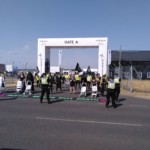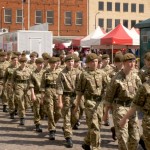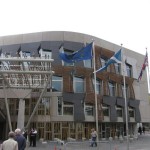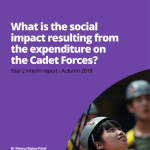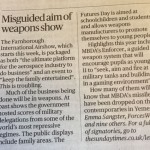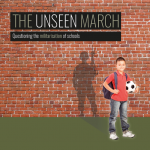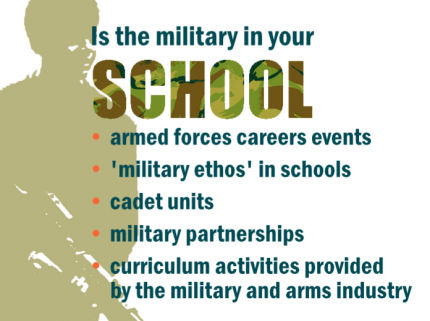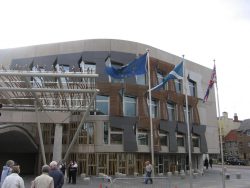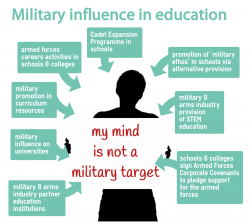 The UK armed forces visit thousands of schools each year. They offer career presentations, curriculum resources and other activities aimed at promoting the interests of the military and long-term recruitment. Since 2012, the Department for Education have promoted ‘military ethos’ programmes such as cadet units in state schools and ‘alternative provision with a military ethos’.
The UK armed forces visit thousands of schools each year. They offer career presentations, curriculum resources and other activities aimed at promoting the interests of the military and long-term recruitment. Since 2012, the Department for Education have promoted ‘military ethos’ programmes such as cadet units in state schools and ‘alternative provision with a military ethos’.
The armed forces and arms companies are increasingly involved in the provision of STEM (science, technology, engineering and maths) activities for school and college students. and they also sponsor a number of careers-led secondary schools. The armed forces also now sponsor youth organisations like Girlguiding and Scouts. See more here.
Should the armed forces by given access to children within education? How can we challenge their activities in schools and colleges? How can a more balanced view of the military be given to young people?
Useful resources
The recruitment agenda behind the UK armed forces’ ‘engagement’ with students in schools and colleges
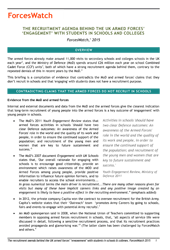
This briefing is a compilation of evidence that contradicts the MoD and armed forces' claims that they don’t recruit in schools and that 'engaging' with students does not have a recruitment purpose.
UK’s compliance with the UN Convention on the Rights of the Child: Report from the Joint Committee on Human Rights
Armed Forces Visits to Secondary Schools in Scotland
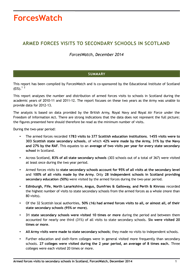 The report, compiled by ForcesWatch, is based on figures obtained under the Freedom of Information Act from the armed forces on their visits to Scottish schools. It has been co-sponsored by the Educational Institute of Scotland which has expressed concerns that some armed forces visits may have a recruitment purpose.
Also see Armed forces visits to schools in Scotland: An update for 2016-2017
The report, compiled by ForcesWatch, is based on figures obtained under the Freedom of Information Act from the armed forces on their visits to Scottish schools. It has been co-sponsored by the Educational Institute of Scotland which has expressed concerns that some armed forces visits may have a recruitment purpose.
Also see Armed forces visits to schools in Scotland: An update for 2016-2017
How ought war to be remembered in schools
 David Aldridge examines the reasons usually advanced for involving children and young people in commemorating the war dead, and finds many of them wanting. He critically examines the high profile in schools of charities, like the Royal British Legion, with vested interests in certain kinds of commemoration. And he argues forcefully for a justification of remembrance in schools that requires a major rethink of established rituals and practices.
David Aldridge examines the reasons usually advanced for involving children and young people in commemorating the war dead, and finds many of them wanting. He critically examines the high profile in schools of charities, like the Royal British Legion, with vested interests in certain kinds of commemoration. And he argues forcefully for a justification of remembrance in schools that requires a major rethink of established rituals and practices.
Conscience and Conviction – WWI school resources
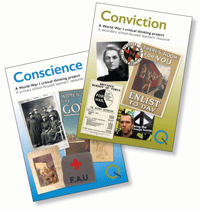 Quaker Peace and Social Witness has produced two new resources for peace education: Conscience (primary school-focused) and Conviction (secondary school-focused).
Conviction can supplement existing lesson materials in subjects such as History, Religious Education or Citizenship, and be used to support the delivery of Personal Social Health Education (PSHE) or Spiritual Moral Social Cultural (SMSC) education.
Through engaging with speaking and listening activities in pairs and groups, children can discuss and reflect on historical source materials including documents, letters, posters and images.
Quaker Peace and Social Witness has produced two new resources for peace education: Conscience (primary school-focused) and Conviction (secondary school-focused).
Conviction can supplement existing lesson materials in subjects such as History, Religious Education or Citizenship, and be used to support the delivery of Personal Social Health Education (PSHE) or Spiritual Moral Social Cultural (SMSC) education.
Through engaging with speaking and listening activities in pairs and groups, children can discuss and reflect on historical source materials including documents, letters, posters and images.
Engage: the Military and Young People
A short film made by Headliners and ForcesWatch, 2014
Why does the military have a 'youth engagement' policy and why is the government promoting 'military ethos' within education? What is the impact of military activities taking place in schools? ForcesWatch have been working with the charity Headliners and a group of young people in London to produce this short film which explores these questions and gives teenagers the opportunity to voice their reaction to the military’s interest in their lives.Peace Education Network
 The Peace Education Network is a national UK network that brings together people and organisations committed to education for peace.
The Peace Education Network is a national UK network that brings together people and organisations committed to education for peace.
Teach Peace pack
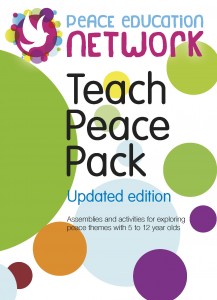 Teach Peace, a new resource from the Peace Education Network, is a set of eight assemblies, follow-up activities, resources, prayers and reflections on peace for primary schools.
From the UN peace day, 21 September, to the International Day for Children as Victims of War, 4 June, the school year is ?lled with opportunities to use the assemblies and activities in Teach Peace. This resource will help to ensure peace is a key theme in our children’s education and help you to celebrate peace and the peacemakers in your school.
The entire resource is free to download below. Hard copies of Teach Peace are available from the Peace Education Network for £5. Also available in Welsh.
Teach Peace, a new resource from the Peace Education Network, is a set of eight assemblies, follow-up activities, resources, prayers and reflections on peace for primary schools.
From the UN peace day, 21 September, to the International Day for Children as Victims of War, 4 June, the school year is ?lled with opportunities to use the assemblies and activities in Teach Peace. This resource will help to ensure peace is a key theme in our children’s education and help you to celebrate peace and the peacemakers in your school.
The entire resource is free to download below. Hard copies of Teach Peace are available from the Peace Education Network for £5. Also available in Welsh.
Camouflage Kids: How the military affects young people’s lives
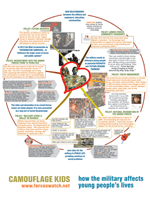 A ForcesWatch poster showing policy, cultural and other recent developments affecting the extent of military influence in young people's lives.
A ForcesWatch poster showing policy, cultural and other recent developments affecting the extent of military influence in young people's lives.
The military’s influence in UK education
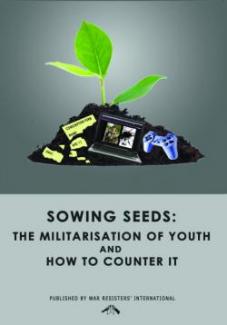 by Emma Sangster in Sowing Seeds: The Militarisation of Youth and How to Counter It, War Resisters International, 2013
by Emma Sangster in Sowing Seeds: The Militarisation of Youth and How to Counter It, War Resisters International, 2013

